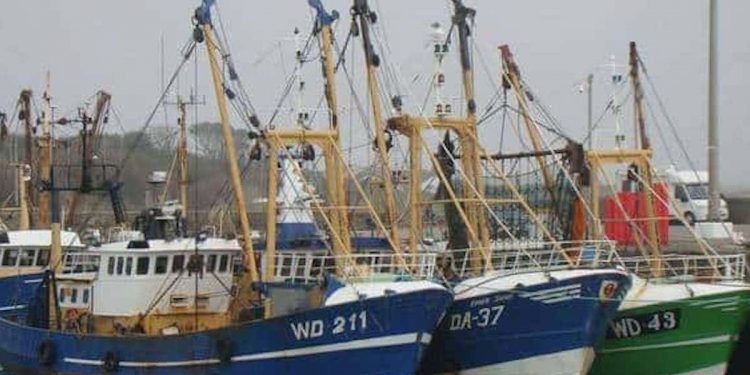A temporary voluntary fleet tie-up scheme for fishing vessels in the polyvalent, beam trawl and other specific segments of the Irish fishing fleet has been announced by minister Michael Creed.
Eligible vessels will be supported to voluntarily opt to tie up for one or two of the next three months, operational from 1st June 2020 and availability will be extended to the inshore fleet and to larger vessels. This scheme will be implemented under Ireland’s European Maritime and Fisheries Fund Operational Programme 2014-20, co-funded by the Government of Ireland and the European Union.

‘The new Covid-19 Voluntary Fleet Tie-up Scheme will support the fixed costs incurred by owners of fishing vessels while tied up. The Scheme is designed to complement the Covid-19 wage supports and loan arrangements already being provided by Government to the fishing sector and indeed other sectors of our economy,’ said Minister for Agriculture, Food and the Marine Michael Creed.
Supports to fixed costs will range from €6000 per month for a maximum of two months for the largest vessels over 24 metres, to €500 per month for a maximum of two months for vessels under 6 metres in length.
‘The tie-up scheme will be available to a maximum of 66% of the fishing fleet, in the different size categories, in any one month. The voluntary scheme will operate over the calendar months of June, July and August, to coincide with the monthly fisheries quota management periods, in order to adjust the supply of fish coming onto a currently depressed market and protect quota availability for later in the year,’ he said.
‘Any vessel not receiving support to tie-up in any particular month may continue to fish to underpin the Government’s policy of ensuring that the food chain is maintained.’
Announcing the scheme, Minister Creed commented that the Irish fishing sector has been particularly hard hit by the severe market disruption in Europe and internationally caused by the Covid-19 pandemic. The closure of many markets and disruption of established distribution channels, particularly to restaurants and the food service industry domestically and internationally, has seen market demand and sale prices drop very substantially in many key markets.
‘In these unique and unprecedented circumstances, it is useful to give the fishing fleet another option to help match supply with demand in the seafood markets,’ he said.
‘There are still markets open both domestically and internationally and it is important that we continue to supply these markets to maintain food supply, service our established customers and be in a position to take advantage of increased demand as markets open up. To that extent, we want to see a continuing level of fishing by our fishing fleet. However, to temporarily facilitate the industry to better match fishing activity with market demand, I am now putting in a temporary scheme to support a portion of our fleet who voluntarily choose to tie up, while others continue fishing.’









